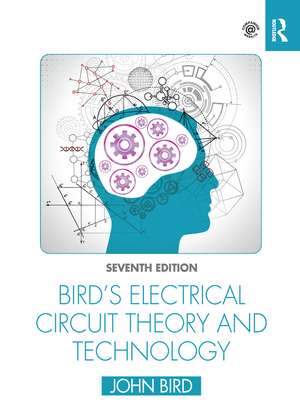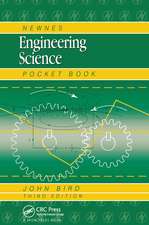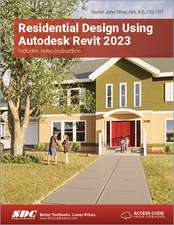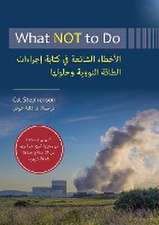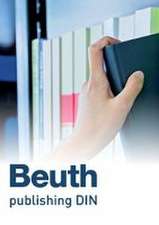Bird's Electrical Circuit Theory and Technology
Autor John Birden Limba Engleză Paperback – oct 2021
The extensive and thorough coverage, containing over 800 worked examples, makes this an excellent text for a range of courses, in particular for Degree and Foundation Degree in electrical principles, circuit theory, telecommunications, and electrical technology. The text includes some essential mathematics revision, together with all the essential electrical and electronic principles for BTEC National and Diploma syllabuses and City & Guilds Technician Certificate and Diploma syllabuses in engineering. This material will be a great revision for those on higher courses.
This edition includes several new sections, including glass batteries, climate change, the future of electricity production, and discussions concerning everyday aspects of electricity, such as watts and lumens, electrical safety, AC vs DC, and trending technologies.
Its companion website at www.routledge.com/cw/bird provides resources for both students and lecturers, including full solutions for all 1400 further questions, multiple choice questions, lists of essential formulae and bios of famous engineers; as well as full solutions to revision tests, lab experiments, and illustrations for adopting course instructors.
| Toate formatele și edițiile | Preț | Express |
|---|---|---|
| Paperback (1) | 408.08 lei 3-5 săpt. | +100.28 lei 7-13 zile |
| CRC Press – oct 2021 | 408.08 lei 3-5 săpt. | +100.28 lei 7-13 zile |
| Hardback (1) | 1322.95 lei 6-8 săpt. | |
| CRC Press – oct 2021 | 1322.95 lei 6-8 săpt. |
Preț: 408.08 lei
Nou
Puncte Express: 612
Preț estimativ în valută:
78.09€ • 83.50$ • 65.11£
78.09€ • 83.50$ • 65.11£
Carte disponibilă
Livrare economică 27 martie-10 aprilie
Livrare express 13-19 martie pentru 110.27 lei
Preluare comenzi: 021 569.72.76
Specificații
ISBN-13: 9780367672225
ISBN-10: 0367672227
Pagini: 930
Ilustrații: 66 Tables, color; 1057 Line drawings, black and white; 52 Halftones, black and white; 1109 Illustrations, black and white
Dimensiuni: 210 x 280 x 48 mm
Greutate: 2.47 kg
Ediția:7 ed
Editura: CRC Press
Colecția Routledge
Locul publicării:Boca Raton, United States
ISBN-10: 0367672227
Pagini: 930
Ilustrații: 66 Tables, color; 1057 Line drawings, black and white; 52 Halftones, black and white; 1109 Illustrations, black and white
Dimensiuni: 210 x 280 x 48 mm
Greutate: 2.47 kg
Ediția:7 ed
Editura: CRC Press
Colecția Routledge
Locul publicării:Boca Raton, United States
Public țintă
Adult education, Further/Vocational Education, and Undergraduate CoreCuprins
Section 1 Revision of Some Basic Mathematics 1. Some Mathematics Revisio 2. Further Mathematics Revision
Section 2 Basic Electrical and Electronic Engineering Principles 3. Units associated with basic electrical quantities 4. An introduction to electric circuits 5. Resistance variation 6. Batteries and alternative sources of energy 7. Series and parallel networks 8. Capacitors and capacitance 9. Magnetic circuits 10. Electromagnetism 11. Electromagnetic induction 12. Electrical measuring instruments and measurements 13. Semiconductor diodes 14. Transistors Section 3 Electrical Principles and Technology 15. D.c. circuit theory 16. Alternating voltages and currents 17. Single-phase series a.c. circuits 18. Single-phase parallel a.c. circuits 19. D.c. transients 20. Operational amplifiers 21. Global climate change and the future of electricity generation 22. Three-phase systems
23. Transformers 24. D.c. machines 25. Three-phase induction motors Section 4 Advanced circuit theory and technology 26. Revision of complex numbers 27. Application of complex numbers to series a.c. circuits 28. Application of complex numbers to parallel a.c. circuits 29. Power in a.c. circuits 30. A.c. bridges 31. Series resonance and Q-factor 32. Parallel resonance and Q-factor 33. Introduction to network analysis 34. Mesh-current and nodal analysis 35. The superposition theorem 36. Thévenin’s and Norton’s theorems 37. Delta-star and star-delta transformations 38. Maximum power transfer theorems and impedance matching 39. Complex waveforms 40. A numerical method of harmonic analysis 41. Magnetic materials 42. Dielectrics and dielectric loss 43. Field theory 44. Attenuators 45. Filter networks 46. Magnetically coupled circuits 47. Transmission lines 48. Transients and Laplace transforms Section 5 General reference
Section 2 Basic Electrical and Electronic Engineering Principles 3. Units associated with basic electrical quantities 4. An introduction to electric circuits 5. Resistance variation 6. Batteries and alternative sources of energy 7. Series and parallel networks 8. Capacitors and capacitance 9. Magnetic circuits 10. Electromagnetism 11. Electromagnetic induction 12. Electrical measuring instruments and measurements 13. Semiconductor diodes 14. Transistors Section 3 Electrical Principles and Technology 15. D.c. circuit theory 16. Alternating voltages and currents 17. Single-phase series a.c. circuits 18. Single-phase parallel a.c. circuits 19. D.c. transients 20. Operational amplifiers 21. Global climate change and the future of electricity generation 22. Three-phase systems
23. Transformers 24. D.c. machines 25. Three-phase induction motors Section 4 Advanced circuit theory and technology 26. Revision of complex numbers 27. Application of complex numbers to series a.c. circuits 28. Application of complex numbers to parallel a.c. circuits 29. Power in a.c. circuits 30. A.c. bridges 31. Series resonance and Q-factor 32. Parallel resonance and Q-factor 33. Introduction to network analysis 34. Mesh-current and nodal analysis 35. The superposition theorem 36. Thévenin’s and Norton’s theorems 37. Delta-star and star-delta transformations 38. Maximum power transfer theorems and impedance matching 39. Complex waveforms 40. A numerical method of harmonic analysis 41. Magnetic materials 42. Dielectrics and dielectric loss 43. Field theory 44. Attenuators 45. Filter networks 46. Magnetically coupled circuits 47. Transmission lines 48. Transients and Laplace transforms Section 5 General reference
Notă biografică
John Bird, BSc (Hons), CEng, CMath, CSci, FIMA, FIET, FCollT, is the former Head of Applied Electronics in the Faculty of Technology at Highbury College, Portsmouth, UK. More recently, he has combined freelance lecturing at the University of Portsmouth, with Examiner responsibilities for Advanced Mathematics with City and Guilds and examining for the International Baccalaureate Organisation. He has over 45 years’ experience of successfully teaching, lecturing, instructing, training, educating, and planning of trainee engineers study programmes. He is the author of 146 textbooks on engineering, science, and mathematical subjects, with worldwide sales of over one million copies. He is a chartered engineer, a chartered mathematician, a chartered scientist and a Fellow of three professional institutions. He has recently retired from lecturing at the Royal Navy’s Defence College of Marine Engineering in the Defence College of Technical Training at H.M.S. Sultan, Gosport, Hampshire, UK, one of the largest engineering training establishments in Europe.
Descriere
This undergraduate and advanced pre-degree textbook includes 850 worked examples. Now with glass batteries, climate change and the future of electricity production. Its companion website includes multiple choice tests, laboratory experiments, and 1400 questions and solutions.
